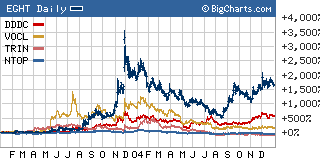
NEW YORK (CNN/Money) � This should be the year when Internet phone service really takes off.
Yeah, you've probably heard that before. Voice over Internet protocol (VoIP) has been a buzzed about technology for the past few years.
Still, there's a growing sense that 2005 will see a lot more consumer acceptance of VoIP, as more and more telecom and cable companies aggressively roll out and promote Internet phone calling plans.
I wrote about several VoIP stocks at the end of 2003 and warned investors to be wary.
And even though shares of the five companies I mentioned in that column wound up plunging an average of 40 percent last year, I still think investors should resist the temptation to think of them as bargains. Larger cable and telecoms and equipment providers are safer ways to capitalize on the VoIP trend.
Sure, the smaller companies that focus primarily on VoIP -- the pure plays, as opposed to the behemoth cable companies and telecoms -- should report strong growth this year.
For example, 8X8 (Research), which offers the Packet8 VoIP service, reported a 50 percent sequential increase in VoIP sales in its most recent quarter and a 53 percent sequential jump in subscribers.
 |
|
| What a difference a year makes. VoIP pure plays 8X8, deltathree, VocaTec, Trinsic and Net2Phone cooled off last year after a torrid 2003. |
And Net2Phone (Research), which is offering VoIP services to cable companies on an outsourced basis and also has its own VoIP offering called VoiceLine, saw a nearly 50 percent sequential increase in subscribers in its latest quarter.
That sure sounds impressive. But Victor Schnee, president of Probe Financial Associates, an independent telecom research firm, said investors have to focus on how much it is costing these smaller players to sign up customers.
Like the rest of telecom, the only major difference between phone plans is the monthly price. That means service providers are going to have to do a fair amount of promotion. And that could cut into profits.
"There's an issue as to whether profit margins will be sustainable," said Schnee. "Marketing costs are going to be very high and this is going to be a very competitive business," said Schnee.
8X8, spent $3.6 million on selling, general and administrative (SG&A) expenses, which includes marketing, in its fiscal second quarter. But the company only took in $2.5 million in revenues.
And for Net2Phone, SG&A expenses accounted for 63 percent of sales in its latest quarter. Neither company is expected to post a profit this year.
Cable cos. and equipment suppliers are better bets
Meanwhile, the pure plays are going to face increased challenges from larger companies that can offer more than just telephone service.
"The biggest winners in VoIP will be the major cable companies," said James Lee, a telecom analyst with Decision Economics Investment Research. "Voice is not an attractive business on a standalone basis."
Lee said he expects Comcast, (Research) Cox, Cablevision (Research) and Time Warner (Research), which is the parent company of CNN/Money, to promote VoIP heavily to lure customers away from the Baby Bells, which are becoming increasingly competitive with cable firms in the broadband Internet access market.
But as is the case with any new technology, the biggest winners probably aren't going to be the companies that sell the service directly to consumers since those are the ones that face the most intense competitive pressure.
Greg Gorbatenko, an analyst with Marquis Investment Research, said that a better way for investors to play the VoIP trend is to look at companies supplying gear to the cable and telecom companies.
With that in mind, UTStarcom (Research), which recently announced that it will manufacture a wireless handset that will allow customers to make Internet phone calls using a VoIP connection, could be worth a look.
Another company that might be worth checking out is Sonus Networks (Research), which makes switches and other telecom equipment for use in VoIP networks.
Of course, large networking firms like Cisco Systems (Research), Juniper Networks (Research) and Lucent Technologies (Research), are also making a heavy push into VoIP equipment, Gorbatenko said.
And the advantage of investing on suppliers as opposed to service providers is that you avoid having to make the difficult bet on who will win the consumer market share battle.
"The loyalty of a subscriber is driven by price. But all the service providers are going to have to buy equipment," Gorbatenko said.
Analysts quoted in this story do not own shares of the companies mentioned and their firms have no investment banking relationships with the companies.
The writer of this column owns shares of Time Warner through his company's 401(k) plan.
Sign up to receive the Tech Investor column by e-mail.
Plus, see more tech commentary and get the latest tech news.

|

